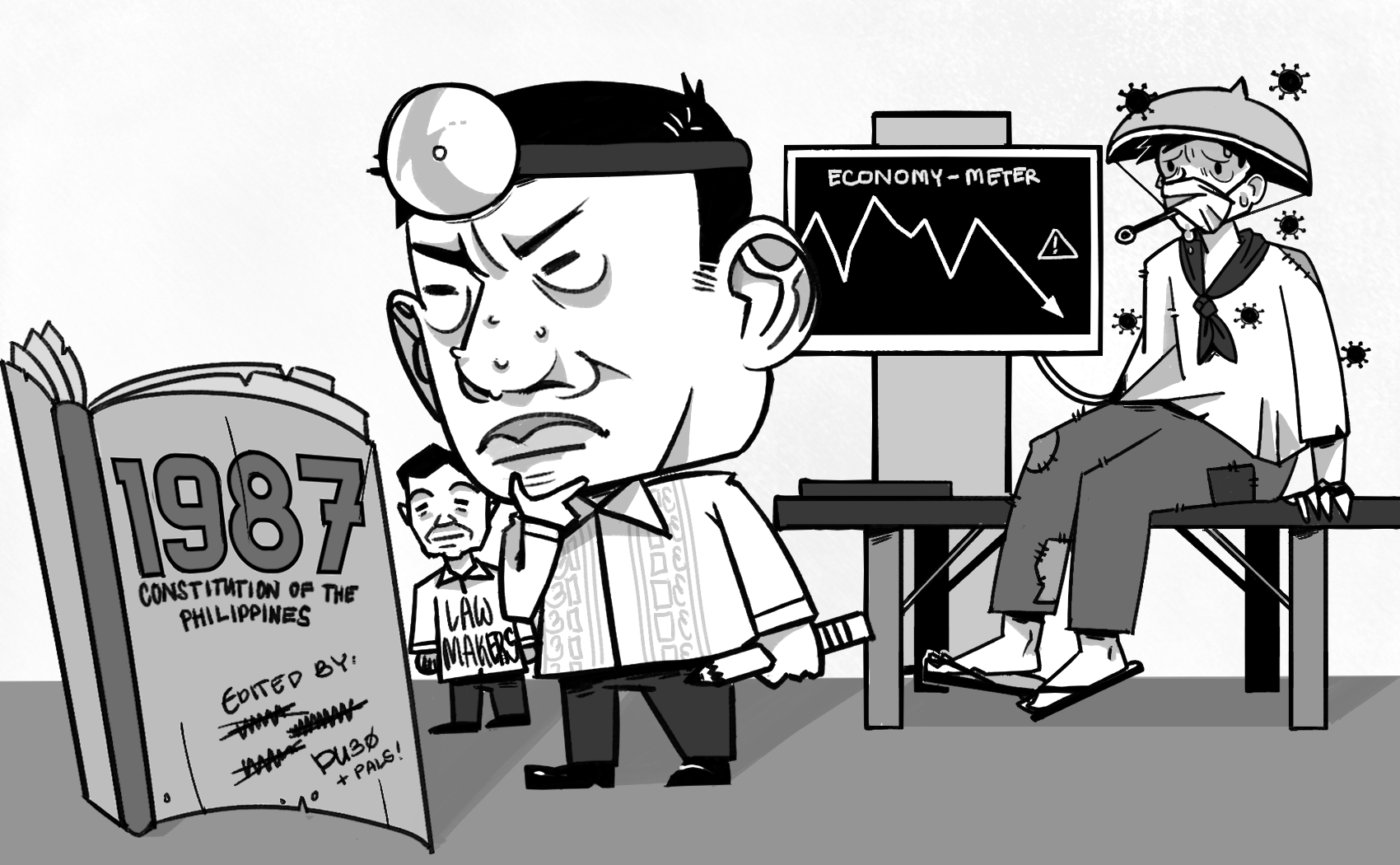WITH THE COVID-19 pandemic causing a maelstrom of national crises, several officials have recently proposed drastic economic and political amendments to the 1987 Constitution. While attempts to amend the Constitution date back to former President Fidel V. Ramos’ term in 1997, the push for Charter Change (Cha-cha) warrants closer public scrutiny.
The pandemic pushed the country to its worst recession since World War II with a steep 9.5% drop in the gross domestic product (GDP). With 4 million Filipinos unemployed as of January, the country now confronts pressing livelihood and health crises. To temper these, Congress aims to amend economic constitutional policies in order to ease foreign investment restrictions in the country. However, the amendments stipulated in the latest House resolutions include the insertion of the phrase, “unless otherwise provided by law” in select economic policies, leaving the Constitution open to interpretation.
Considering the government’s poor pandemic response and its continuous attempts to stifle dissent, any attempt to propose changes to the Constitution should be met with vigilance.
Capitalizing on changes
The Philippines wrestling against the health crisis and reeling economic effects does not merit constitutional reform. While loosening restrictions on foreign investments may seem beneficial to the economy, Cha-cha remains a highly divisive issue that will shift public focus and national resources away from the threat of the pandemic.
Since the plebiscite for economic amendments to the Constitution will coincide with the 2022 national elections, this entails serious delays in ushering economic relief to ailing citizens and enterprises alike. The COVID-19 pandemic requires an immediate response—one where stimulus relief payments such as the social amelioration fund and the continued development of micro, small, and medium enterprises are at the helm of Congress’ priorities.
Although financial aid is crucial in addressing the pandemic’s devastating effects to the economy, the Philippines is also in dire need of a strengthened medical response to combat the COVID-19 virus. The government aims to inoculate 70 million Filipinos within the year—however, due to the slow vaccination rollout, the World Bank lowered its 2021 growth forecast for the country from 5.9% to 5.5%, short of the government’s 6.5% to 7.5% initial GDP growth target.
Additionally, while Congress has proposed an additional Php 72.5 billion in the national budget for COVID-19 vaccines, this may only cover about 25% of the population—failing to reach the 60% needed to achieve herd immunity.
Beyond ongoing efforts to amend the constitution and confronting mounting pressure to improve the national response against COVID-19, officials have lobbied for the abolishment of the party-list system in order to eliminate the alleged infiltration of communist insurgents in the government. While the party-list system is flawed and prone to manipulation for political advantage, it remains crucial for sectoral representation in governance. Removing this system altogether poses a threat to our democracy as it narrows down room for dissent—the proposal merely hinges on the reckless cases of red-tagging and affirms unverified claims of a growing insurgency within the government.
Delineating from democracy
In a time of heightened national instability, constitutional reform is a dangerous proposal to prioritize. As more citizens are forced into poverty—a circumstance that will likely persist even after President Rodrigo Duterte’s term—placing focus on drastic constitutional amendments in lieu of implementing measures that directly combat the pandemic may only perpetuate corruption and gross neglect.
Given the country’s dire situation, the push for Cha-cha reveals the government’s misplaced priorities—a violation of their role as the governing body of the Philippines, whose sole mandate is to uphold the welfare of all Filipinos.
As Congress deliberates Cha-cha, the Filipino citizenry must remain vigilant of any attempts to change the foundation of this country’s democracy, especially in a timeline riddled with uncertainties. The government must continue to propose long-term solutions that address the country’s most pressing issues without investing much of its energy, resources, and attention to amend the constitution at the cost of citizens’ lives.




